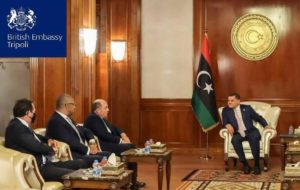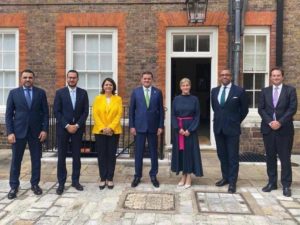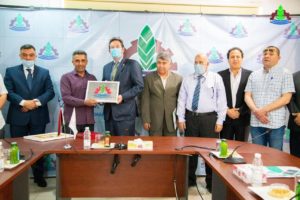30th June 2021 Tripoli, Libya
A Busy June
June has been an action-packed month for the UK-Libya relationship. We’ve seen a UK ministerial delegation in Libya for the first time in three years, the Libyan Prime Minister in the UK, and the international community coming together for the second Berlin Conference. We have also seen the first visit to Misrata by a UK Ambassador for over two years. I wanted to take the opportunity to let you know what we’ve been up to, and share some of what’s coming up next.
UK Ministerial Visit to Libya
On 9 June, FCDO Minister of State for Middle East and North Africa James Cleverly visited Tripoli for two days of meetings with political figures and civil society activists, where he was joined on the second day by Secretary of State for Defence Ben Wallace. This was the first UK ministerial visit to Libya since 2018 – a sure sign of the progress Libya has made towards achieving stability in the last 18 months. The visit demonstrated the UK’s commitment to Libya’s future. We look forward to welcoming more UK ministerial and official visitors over the summer and beyond.

Berlin Conference
Last week, I joined the UK delegation to the second Berlin Conference, which brought together leaders of the international community to reaffirm the commitments made in Berlin over a year ago, and agree a shared view of the next steps as Libya moves towards elections. To me, one sign of progress came in the presence of Prime Minister Dabaiba and Foreign Minister Mangoush at the conference – it is vitally important that Libyans are central to the process. A big part of our job in the international community is to support UNSMIL to help deliver the agreed roadmap towards elections on 24 December and the full implementation of the ceasefire, and to support efforts by Libyans to stabilise their country and build a prosperous, democratic future. Last week’s Berlin Conference marked a further step in that process as attendees agreed on the importance of holding elections, as well as the need for all foreign forces and mercenaries to withdraw.
Libyan Prime Minister in London
Immediately after the Berlin Conference, I accompanied PM Dabaiba and Foreign Minister Mangoush on their first official visit to London, where they met the UK Prime Minister, HRH the Countess of Wessex, as well as other politicians and officials. There were a range of topics on the agenda, including preparation for elections and implementing the ceasefire. We also covered trade issues, climate change and how best to improve the participation of women in Libya’s peace process. The UK and Libya will both benefit from meaningful conversations on these subjects, and I’m particularly pleased to be working with the Government of National Unity as it works towards ratifying the Paris Agreement, bringing Libya into the international conversation on how best to combat climate change.

Misrata
Earlier this month I was able to get on the road and pay a visit to Misrata. For a diplomat it is so important to travel within the country and build understanding. But it has been very challenging to get beyond Tripoli during the past two years. With the security conditions in Libya improving, so are prospects for more travel around the country. Following a fruitful political, commercial, and military visit to Misrata, an added highlight was a stop at the Pheonician-Roman archaeological site of Leptis Magna. The city saw great development under Emperor Septimius Severus, with whom I feel a certain connection: he was born in Leptis Magna and died in my home town of York in the UK. Libya’s cultural heritage is vast, and provides an insight into the huge potential this country possesses.

What next?
After the flurry of international visits, we are particularly focused on the pressing issues facing Libya. It will be important to establish quickly now a constitutional basis in order to hold elections, and I will be discussing this issue with a wide range of Libyans over the coming weeks. An agreed budget will allow important work to begin on improving service delivery to improve the lives of all Libyans. This is especially urgent with regards to electricity now that we are in the hot summer months. It will also be essential to see further progress on implementation of the ceasefire agreement. Libyans have been clear that there must be no lasting foreign military presence in their country; we in the international community must respect their demands. While recognising the challenges to be overcome, I believe that progress against all these challenges is possible; the Libyan people deserve no less.
Thank you ambassador Hupton for all your work in Libya. As for the issues at hand in Libya, I hope that we all focus on producing a government with a popular mandate so that it may tackle our many challenges with greater credibility and thus effectiveness. A zero-sum presidential competition with a winner-takes-all result is the wrong solution at the wrong time. Neither the security situation nor the lack of effective legislative and judicial authorities is conducive to such a competition. Finally, I hope you’d look into the High National Elections Commission’s ability to monitor the expected influx of political money (from domestic and foreign sources) into these elections. I expect you to be shocked that it has none.
Best Regards,